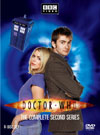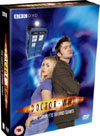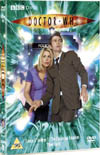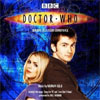DVD Extras (box sets only) include:
An Alien? Planet
I did come up with a theory on what this might all be leading up to, which somewhat excused the copying of Earth, but I'll only share that if you're ready for spoilers for the entire season in the In-Depth Analysis version of this review. Several characters from "The End of the World" (story no. 162) are back, this extra exposure allowing them to become more well-rounded characters. In the case of the Lady Cassandra, self-proclaimed last pure human, this is literal as well as figurative. Her previous obsession with becoming ultra flat is now mysteriously replaced with the desire to become fully normal physically. It seems flatness was just the fad of the moment, and a fad that she had a particularly bad experience with. Zoe Wannamaker brings the role to life once more, but this time the role is not hers alone, with Billie Piper, David Tennant, Sean Gallagher, and an uncredited extra all adding their own take into a great mix. Well done. Also back for a second go is the Face of Boe, now sporting an aura of mystery and awe that was sadly unhighlighted in his first appearance. Murray Gold steps up to the plate and delivers the most awesome and memorable new piece of music in the story, anchoring that mood directly into Boe's theme. Boe also creates great anticipation for more revelations in future Doctor Who stories, and is a much welcome element to this story. The exploration of the Earth/alien culture mix continues into a stunningly spacious hospital lobby and the sisterhood of cats running the place. Excellent concept, excellent prosthetic make-up for the cats, and excellent work from the actresses all help make the cat-nuns an outstandingly successful new species. (Yes, I'm a cat lover, and part-time cat whisperer.) It's just too bad the species doesn't have a specific name yet. And are they native to this "New Earth" planet, or did they also come from somewhere else? If they are native, what did they call the planet before the humans moved in? (Can you spot Adjoa Andoh as Sister Jatt, who would go on to play Martha Jones' mother, without the cat prosthetics, in the following season?) The exploration naturally shifts from the general to the specific, as the Doctor, Rose, and Cassandra each get something different to investigate. The plot escalates well, until it is delivering revelations, action, and many character scene gems. Billie Piper does a lot of good acting in this one, even without getting a lot of screen time as Rose. Her portrayal of Cassandra is excellent, totally believable, and very enjoyable. On the commentary, executive producer Julie Gardner suspects many old fans may be upset to see Cassandra/Rose smooch the Doctor. Not sure why. The only thing that might upset me is the Doctor falling in love with Rose romantically, not because things like that shouldn't happen in Doctor Who, but because I feel that Rose is just too simplistic and, to repeat Cassandra's accurate observation, "common" to be the Doctor's type. However, if Rose or Cassandra want to be infatuated with him (as Cameca was back in "The Aztecs" (story no. 6) in the pioneering days of the show), it seems a perfectly okay place to go. And David Tennant really is great in this one as the Doctor. He gets to show a wide range of the Doctor's best characteristics, much wider than his limited screen time in "The Christmas Invasion" (story no. 171) allowed, and Tennant nails them all with tremendous charisma and impact. A super Doctor!
Murray Gold's cue for the resolution of the main action plot seems to be reaching desperately for the right melody or chord sequence and not quite finding it, but hinting at the right mood. However, Gold's later final cue of the story is exquisite and perfect, and really defines the mood of the last scene where, without the music, it may have been much more ambiguous and left many audience members a bit emotionally lost. Well done, Murray!
This story has become available on DVD. Click on the Amazon symbol for the location nearest you for pricing and availability:
Note: The full season sets contain commentaries, behind-the-scenes featurettes, and other extras. The smaller volumes only feature the plain episodes. Comments on this article are welcome. You may contact the author from this page:
|









